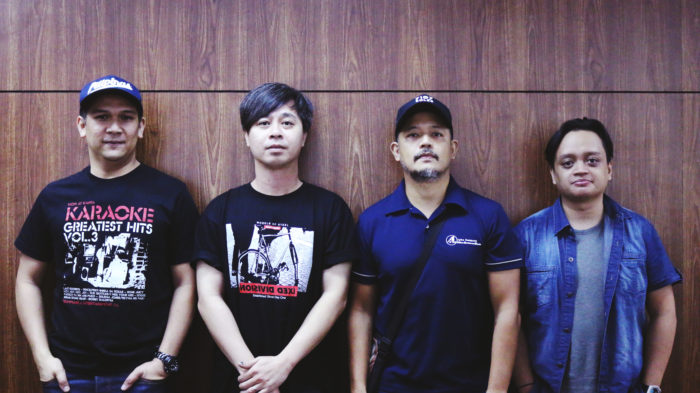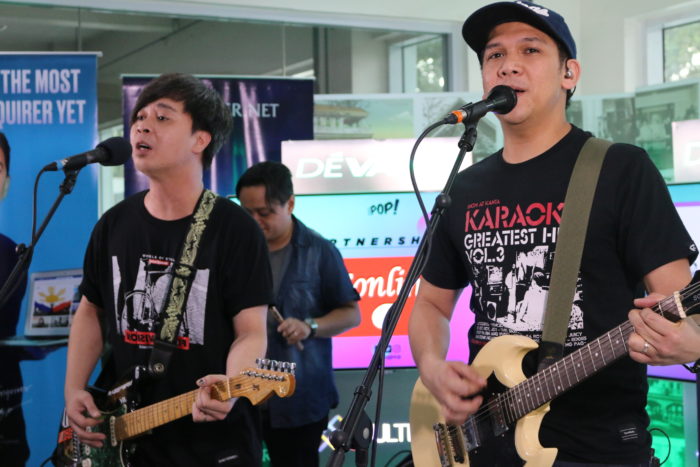
(L-R) Mark Escueta, Mike Elgar, Nathan Azarcon, and Ryan Peralta are Rivermaya. Image: INQUIRER.net/Gillian Lasic
When Rivermaya is asked how their music has lasted so long, Mark Escueta quips, “Change members every now and then.”
After the laughter has died down, he says with seriousness, “As long as gusto mong gawin, hindi siya dapat mahirap, basta may instrumento kang tutugtugin.” (As long as you enjoy what you’re doing and you have an instrument to play, it’s not supposed to be difficult.)
This reincarnation of Rivermaya consists of Escueta and Mike Elgar on guitar, Nathan Azarcon on bass, and Ryan Peralta on drums. Escueta, Elgar and Azarcon take turns on vocals.
Azarcon officially reunited with the group in the middle of 2016, 15 years after he left to work with another Rivermaya alumnus, Bamboo Mañalac.
In September, the band released their latest album “Sa Kabila ng Lahat”, a collaboration with “no theme, no rules,” shares Elgar, with everyone contributing to the songwriting process.
Any idea could turn into a jam session where they would hash out the arrangements for hours until they are pleased with what they heard.
The result is eight diverse songs that are true to Rivermaya’s alternative rock roots.
Irena, LDRs, and a worship song?

Mike Elgar and Mark Escueta. Image: INQUIRER.net/Gillian Lasic
Years in the music biz have not chipped away at their awe for music; one song they excitedly talk about is “Irena”.
Was she an ex, a muse?
“She’s a Polish social worker [who] saved a lot of baby Jews. 2,500 babies,” says Elgar. They agree that she should be celebrated as much as Oskar Schindler of the movie “Schindler’s List”, a German who saved Jewish employees.
The song starts out with sounds of war—a siren, gunshots—before sliding into an airy verse and a rumbling chorus.
“She’s a fighter of lost children/No one remembers her name/Irena how can I forget,” the tribute goes.
“SBN” (Sobrang Bagay Natin) has a ukelele harmony that gives a feel of a sunny beach day, and is a hopeful tune for long-distance relationships.
“Sobrang bagay natin/pwede kang ‘wag mag-alala/Malayo ka sa akin/di naman nagbabagong nadarama.” (We’re such a match/ you don’t need to worry/ You’re far away from me/ but that doesn’t change what I feel.)
Escueta relates that when the band started to have families, going out of town meant something different. “Atat ka nang umuwi. Namimiss mo family mo.” (You want to go home right away. You miss your family).
While penning the song, he thought of OFWs and couldn’t imagine the pain of working abroad and not seeing your family for years.
But Escueta’s personal favorite is the uplifting “One Step” because his three-and-a-half year old—who accompanies him to sessions—easily picked it up.
Meanwhile, it’s “Mula Ngayon” for Peralta, the first song they wrote, because it can be interpreted in different ways.
“Ikaw lamang, wala nang iba/Habangbuhay ako magsisilbi sa’yo (There’s only you and no one else/I will serve you for as long as I live),” sounds like an earnest love song fit for a rainy day, but the soulful melody and lyrics could also be “spiritual,” he says.
Adapting to the digital age
Rivermaya performed classic hits like “Umaaraw, Umaalan” for INQUIRER.net. Image: INQUIRER.net/Gillian Lasic
On music in the digital age, Elgar muses, “Lahat ng schedule namin nasa FB, Instagram. Paano dati na nasusundan nila?” (All of our schedules are posted on Facebook, Instagram. How did fans follow bands before?)
They reminisce on the power of word of mouth, searching for gigs in newspapers, spreading flyers.
“Dati mas may mystery sa artist,” notes Azarcon. (There used to be more mystery to artists.)
They’ve caught up to the digital age too: the band has active social media accounts and their songs can be streamed on Spotify and downloaded on iTunes. Peralta even uses a drum pad rather than an entire drum set while performing.
They appreciate the instant interaction with listeners, such as on Facebook Live, and that now, musicians have several free options to learn how to make music; they had to rely on teachers or cassette tapes years back.
But the Internet has challenged the music industry too. “Nasasanay [sila] sa libre,” Escueta says, noting that in the past, there was more effort to get new music. “Dati kailangan mag-ipunan, maghihiram sa classmate.” (Fans are used to getting things for free. Before, you had to save for or borrow [a record] from a classmate.)
“Walang tumatalon, naka-cellphone,” says Peralta of concerts today. (Nobody jumps [anymore; they hold on to their] cellphone[s].)
Elgar quips, “Parang kaming mga tito na nag-o-observe.” (We’re like uncles making observations.)
And while audiences can watch their favorite artists online, he adds, “Nothing beats the live experience.”
Music over personality
With social media, Azarcon observes with nostalgia, “walang artistang engrande.” (There are no larger-than-life artists.)
These days, audiences flock to artists they feel are relatable rather than those on a pedestal.
But if the band’s longevity is to go by, it’s that the members have put music over personalities.
With Rivermaya, it’s refreshing to see that there are no airs about them, only inside jokes, and a palpable passion for music. JB
RELATED STORY:
Rivermaya: The past was just an opening gig

